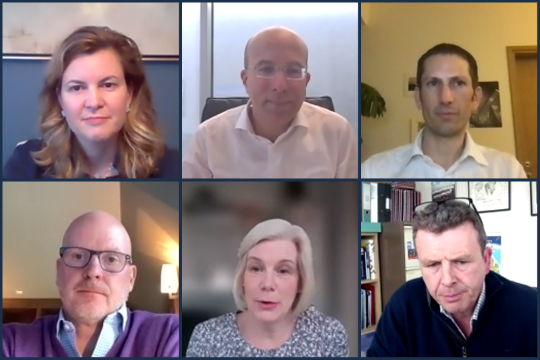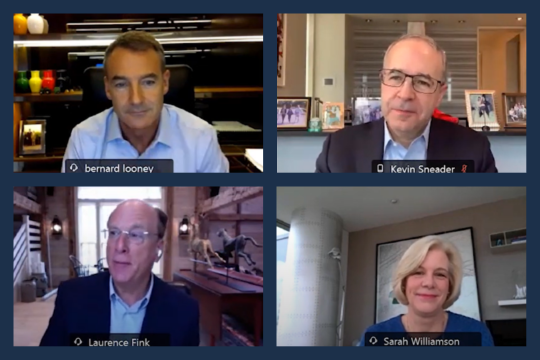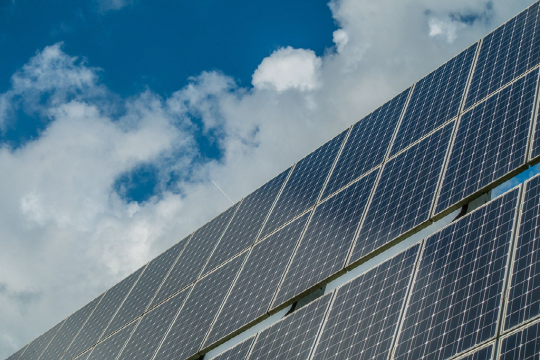On 19 and 20 May 2021, FCLTGlobal hosted Investing in the Sustainable Infrastructure Transition, the latest in a series of panels bringing together leaders in carbon-intensive industries and long-term investors to examine the role of investing in sustainable transitions.
The world’s infrastructure systems face critical challenges as we look to meet the needs of a growing, increasingly urban population while at the same time dramatically reducing carbon emissions. In addition, mitigating the physical risks resulting from climate change will require innovation to develop adaptive long-term infrastructure solutions.
The pressure to reduce carbon emissions has led to increased commitments to net-zero objectives across the capital markets, which in turn has produced strong growth in demand for green investment opportunities. But there are also risks along the way, such as mispricing of “green assets” or the focus on achieving net-zero goals by transferring carbon-emitting assets to others, affecting their own balance sheets or portfolios, but potentially putting those assets with owners less concerned about their environmental impact. Our discussion explored these and other critical issues facing investors in global infrastructure assets.
The discussion featured some of the world’s leading asset owners and asset managers:
Our panelists noted that tensions can exist between achieving individual net-zero goals and actually reducing carbon emissions. Removing “dirty” assets from a particular portfolio all at once may not be realistic and is also less likely to result in actual decarbonization. Additionally, notwithstanding global net-zero commitments, the world will maintain a certain level of reliance on brown power sources. Panelists suggested that an important part of the process might involve making such assets more efficient today while they are being phased out in the long term.
Scott Klimczak, Blackstone’s Global Head of Infrastructure, used natural gas a prime example of an asset in transition, noting that the degree of innovation and investment in natural gas usage is likely to make it “a lot more efficient and a lot less carbon-intensive… That may lengthen the life of natural gas.” While, in the context of net zero portfolio construction, assets such as natural gas may on their face be less attractive, they will continue to generate yield for stakeholders, and thus worth owning to some investors. To balance these investments within a portfolio, companies can focus on applying their capital toward carbon offsets.
Others see a progression from brown to green assets, particularly in energy production. “We need to reshape assets for the net-zero world,” said Emmanuel Jaclot, Executive Vice President and Head of Infrastructure at Caisse de dépôt et placement du Québec. “We’ve decommissioned coal plants. We started replacing it with gas and now we’re replacing it with solar wind. For us it was a great achievement.”
The real hesitation for asset managers may be coming from the potential trade-off between the returns clients expect and building portfolios responsibly. “I am not getting the message that we can dilute returns in exchange for having things cleaner,” added Jaclot. “It’s ‘make good returns and be green.’” To that end, investing in innovation might be the clearest path to achieving both.
In concert with the investment community’s efforts to combat climate change, many global governments and public agencies are employing various approaches to solving the issue. When leveraged strategically, partnerships between the public and private sectors can be a huge asset. If not, they can introduce a myriad of complications.
Specific policy settings will be required to promote effective investment. Kyle Mangini, Global Head of Infrastructure at IFM Investors, weighed in. “From a government perspective there are a couple different variables. The first is just trying to get ahead of the amount of waste that still exists within the system. It is absolutely massive. It’s low hanging fruit. It’s ESG that more than pays for itself immediately… The only way you’re going to change those behaviors is through some type of broad regulation.”
Broad regulation on a global scale would help streamline expectations and may even encourage collaboration. As Mangini pointed out, “One of the most important aspects around change is getting organizations together and aligned and aiming towards the same end-line because we’ll often invest together and if we have the same perspective, it’s a lot easier to affect change. Big global investors seeing eye to eye makes an enormous difference.” Ultimately, complying with regulations can help “force the hand of decision-makers.”
Investing in the Sustainable Infrastructure Transition provided a number of key insights that compel companies and investors alike to act. FCLTGlobal is focused on how to direct long-term capital, at scale, into climate solutions – the innovations and transitions that really affect the climate. We have debated the role of private capital in supporting the world’s infrastructure – moving forward, we would like to understand how much the market is valuing long-term, climate-friendly investments and how that translates to financing costs for those that undertake efforts to transition to a green economy. Currently, we are also researching the most effective ways to operationalize net-zero portfolios, so that investors do not simply exclude challenging assets, but are incentivized to allocate capital to their improvement.
We look forward to completing our series on the sustainable transition this summer. If you have questions about our work on investing in the sustainable transition, contact our research team at [email protected]. As always, to stay up to date on news and updates, follow us on social media at @FCLTGlobal.

Risk and Resilience | Video
14 April 2021 - A discussion from 14 April 2021 among top business leaders and institutional investors on the opportunities ahead to position the food and agriculture industry for a more sustainable future.

Risk and Resilience | Video
6 November 2020 - On Friday 6 November, FCLTGlobal and McKinsey & Company hosted the first panel in our virtual event series, "Investing in the Sustainable Transition." Larry Fink (BlackRock), Bernard Looney (bp), Kevin Sneader (McKinsey), and Sarah Williamson (FCLTGlobal) discussed the progress and outlook for sustainability within the global energy sector.

Risk and Resilience | Article
2 March 2021 - Focusing capital on long-term climate solutions via investment portfolio construction